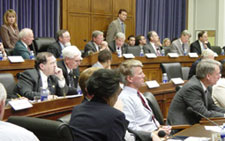 |
| Conference Chairman Young says No more extensions". (Photo courtesy of House Transportation and Infrastructure Committee) |
Funding remained the central, still unresolved, issue as House and Senate negotiators began formal meetings aimed at producing a final version of a multi-year transportation bill. The opening session of the conference committee, held June 9, amounted to little more than a long collection of statements by House and Senate lawmakers. Conferees reached no agreements on any issues, except to approve House Transportation and Infrastructure Committee Chairman Don Young (R-Alaska) as chairman of the conference committee and Senate Environment and Public Works Committee Chairman James Inhofe (R-Okla.) as the vice-chairman.
Key lawmakers talked about the need to finish the bill, which has been delayed since Sept. 30, 2003, when the preceding Transportation Equity Act for the 21st Century, expired. Since then seven extensions have kept the federal highway and transit programs operating. The latest stopgap runs out on June 30. Young told conferees, "There will be no more extensions."
The big issue is the spread between the House's $283.9-billion total -- which the Bush administration says is all it will support -- and the Senate's, which is $11.2 billion higher. Rep. James Oberstar (D-Minn.) said, "Bridging the gap...is absolutely critical." Some Senate negotiators said at the June 9 meeting that lawmakers should settle on a figure between the House and Senate funding totals.
But House Majority Leader Tom DeLay (R-Texas), an important conferee and defender of donor states, said, "It's not as simple as some have said." He says he agrees with President Bush that the transportation bill is an important job producer. "But," DeLay added, "we also have the responsibility to be fiscally responsible in how we approach it."
On the other hand, DeLay also spoke up for donor states, such as Texas, which pay more into the Highway Trust Fund than they get back in federal highway aid. He said, "It's time for donor states to start to keep more of what they contribute...." Many industry officials say, however, that donor states' desires cannot be satisfied at the $283.9-billion mark that the House approved and the White House is backing.
Transportation Secretary Norman Mineta sent a 10-page letter to Young and Inhofe on June 7 that reiterated the administration's veto threat unless the conferees agreed to $283.9 billion.

Post a comment to this article
Report Abusive Comment